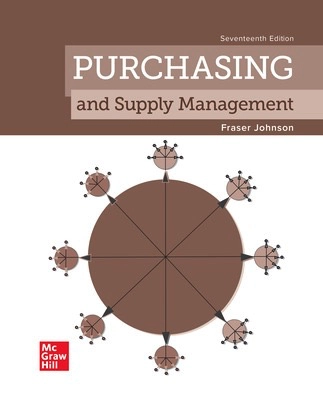A Guide on Using Purchasing and Supply Management in the Classroom
Each day, people working in the field confront a wide range of challenges, evaluate a diverse range of opportunities, and influence significant organizational resources.
Welcome to the exciting world of supply chain management. Each day, people working in the field confront a wide range of challenges, evaluate a diverse range of opportunities, and influence significant organizational resources. They face decisions that include embracing new information technologies, such as artificial intelligence; managing financial, operational, and reputational risks; meeting and exceeding sustainability requirements; and creating and implementing meaningful supply function and supplier metrics. The seventeenth edition of Purchasing and Supply Management incorporates the latest theory and best practices in this exciting field. The overarching theme is based on the conviction that the supply function and suppliers must contribute effectively to organizational goals and strategies. Every organization needs suppliers and the importance of effective supply chain management has never been more critical for organizational success. Organizations must have world-class suppliers if they are to achieve their revenue, profit, customer service, and other goals and objectives.
While several factors differentiate this textbook, the main distinguishing feature is the inclusion of 49 real-life supply chain cases. The cases allow applying the latest research and theoretical developments to real-life issues, opportunities, decisions, and problems faced by practitioners. Instructors who want to incorporate case discussions in their courses can use the cases in the textbook—without having to ask students to purchase cases from third-party sources.
The structure and sequence of the chapters in the textbook have been set to make it convenient for instructors to organize their course syllabi. One approach is to organize the course into five modules. First, as an introduction, chapter 1 provides an overview of procurement and the book, and Chapter 2 identifies the strategic importance of supply management that can be used to frame the course. Chapters 3, 4, and 5 collectively address issues related to the organization of the supply function, management of supply processes, and decisions related to make versus buy.
Chapters 6 to 10 cover the core areas of procurement (quality, quantity, delivery, and price) while chapters 11 to 13 provide coverage of topics related to supplier relationship management. The final module can include chapters 14 to 17. For the final class, I would like to conclude the course with a discussion of one of the cases from Chapter 2 (strategy) or Chapter 17 (supply function evaluation and trends).
 Instructors at all levels—from community colleges to graduate schools—will find the new edition of Purchasing and Supply Management both easy to use and refreshed with timely content. This seventeenth edition is ideal as a stand-alone course in purchasing and supply management, as well as part of a comprehensive supply chain management program that contributes to a holistic body of knowledge. We are honored that you are using our book in your classroom and welcome your questions, comments, and feedback.
Instructors at all levels—from community colleges to graduate schools—will find the new edition of Purchasing and Supply Management both easy to use and refreshed with timely content. This seventeenth edition is ideal as a stand-alone course in purchasing and supply management, as well as part of a comprehensive supply chain management program that contributes to a holistic body of knowledge. We are honored that you are using our book in your classroom and welcome your questions, comments, and feedback.


